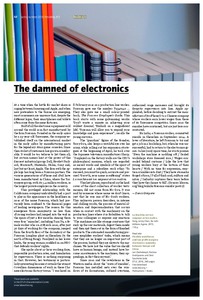The damned of electronics [Book review - La machine est ton seigneur et ton maître]

2016
13
53
assembly line work ; electronics industry ; occupational safety and health ; suicide ; working conditions ; work load ; trade union document
Working conditions
English
"At a time when the battle for market share is raging between Samsung and Apple, and when new pretenders to the throne are emerging, most consumers are unaware that, despite the different logos, their smartphones and tablets often come from the same factories.
Half of all the electronic equipment sold around the world is in fact manufactured by the firm Foxconn. Founded in the early 1970s by a 23-year-old Taiwanese, the company established itself on the international market in the early 1980s by manufacturing parts for the legendary Atari game consoles. Since then its list of customers has grown considerably. It would be too tedious to list them all, but certain names hint at the power of this discreet industrial group: Dell, Hewlett Packard, Microsoft, Nintendo, Nokia, Sony and, last but not least, Apple. The firm with the apple logo has long been a Foxconn partner. The various generations of iPhone and iPad have been manufactured in China, where the Taiwanese group, with its 1.4 million workers, is the largest private employer in the country.
This privileged relationship with the Californian company undoubtedly had a part to play in the appearance in the headlines in 2010 of the name Foxconn, which had previously been confined to the financial pages of leading newspapers. The reason for this emergence from anonymity: no less than 18 young workers had jumped into the void in the space of just a few months. Among them were four "miracles", including Tian Yu, a female worker who on 17 March 2010, after just 37 days of working for the company, jumped from the fourth floor of the dormitory at the Foxconn Longhua plant in Shenzhen (to the north of Hong Kong). Paralysed in her lower limbs, the young woman confided in an NGO that defends workers' rights.
She spoke about 12-hour working days, impossible production rates, and humiliation by supervisors. There is nothing surprising in that. However, her testimony is particularly interesting because it reveals the utmost Orwellian dimensions of work in these Chinese electronic factory towns. "I was hired on 8 February 2010 as a production line worker. Foxconn gave me the number F9347140 … They also gave me a small colour-printed book, The Foxconn Employee's Guide. This book starts with some galvanising words: ‘Don't waste a minute in achieving your wildest dreams', ‘Embark on a magnificent life', ‘Foxconn will allow you to expand your knowledge and gain experience'", recalls the young survivor.
The "guardian" figure of the founder, Terry Gou, also keeps a watchful eye over his army, while rolling out his expansion strategies: at the beginning of April, he took over the Japanese television manufacturer Sharp. "Displayed on the factory walls are the CEO's philosophical maxims, which are regarded as sacred words and symbols of the spirit of enterprise and a relentless work ethic: ‘To succeed, you must be quick, accurate and precise'; ‘Growth, your name is suffering'" states La machine est ton seigneur et ton maître.
This last phrase, reproduced on the hard cover of the short collection of worker testimonies, did not come from Mr Gou. It was said by someone whose name we don't know, just that he was one of Mr Gou's workers. This unknown person describes, in intense and chilling words, the process of mental alienation and depersonalisation that occurs when in contact with the machinery on the production lines where it is forbidden to talk to your colleagues or express any emotion: "The machines are like strange creatures that suck up the raw materials, digest them inside and then spit them out in the form of finished products. The automated manufacturing process simplifies workers' tasks, which means that they are no longer an important part of the process. Instead they are slaves to the machines. We have lost the value that we should have as human beings, and instead have become an extension to the machines, their appendage, in fact their servant."
Since 2010 and the revelations in the Western media about the "wave of suicides", Foxconn has installed nets over the windows of its dormitories, reduced overtime, authorised wage increases and brought its despotic supervisors into line. Apple applauded, before deciding to entrust the manufacture of its iPhone 6 to a Chinese company whose workers earn lower wages than those of its Taiwanese competitor. Since 2010 the suicides have continued, but are just less concentrated.
Xu Lizhi, a Foxconn worker, committed suicide in Shenzhen in September 2014. A lover of literature, he left Foxconn to try and get a job in a bookshop, but, when he was unsuccessful, had to return to the electronics giant. In his (rare) spare time, he wrote poems: "Even the machine is nodding off / Sealed workshops store diseased iron / Wages concealed behind curtains / Like the love that young workers bury at the bottom of their hearts / With no time for expression, emotion crumbles into dust / They have stomachs forged of iron / Full of thick acid, sulfuric and nitric / Industry captures their tears before they have the chance to fall". (Source: libcom. org/blog/xulizhi-foxconn-suicide-poetry) — Denis Grégoire"
Digital;Paper
See also
-
[Book]
La machine est ton seigneur et ton maître
/ 1 ; 1 ; 1.
Agone, 2015. - IX, 109 p.
ISBN 978-2748902389
-
[Article]
Les damnés de l'électronique [Book review - La machine est ton seigneur et ton maître]
/ 1.
HesaMag, 2016, n° 13. - 53
The ETUI is co-funded by the European Union. Views and opinions expressed are however those of the author(s) only and do not necessarily reflect those of the European Union or the ETUI.